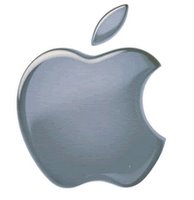
I am told on fairly good authority that the actual announcements will be fairly small. But that's only a rumour, too, and does not sit with what you might call the main spate of rumours that Jobs will again, at the end of his keynote speech, have "just one more thing" that will shred everyone's socks.
In other words, the long-awaited iPod-with-bigger-video-screen-and-mobile-phone.
Before committing my well-bruised body to that maelstrom of speculation and misinformation, let me mention a product much more likely to appear - Apple's iTV.
This, further evidence that Apple aims to dominate the world's living-room entertainment, is a sort of set top box that will stream movies, music video podcasts and picture slide shows from networked Macs and PCs to television sets and video screens.
And now back to those damned iPodPhone rumours.
Speculation about an Apple wireless mobile device has been around for more than a year and, in the lead-up to Macworld 2007 has become all but a frenzy, fed principally by a couple of industry analysts who have gone hard on its imminent release. Of these I have already written, and advised taking some salt with the soup.
Some say it will be a GSM 2.5G phone, others that it will be 3G working in the 1900MHz and 2100MHz wireless frequency bands, and still others, noting what is said to be a relationship between Apple and Cingular, one of the biggest US mobile phone networks, that it will operate in the 850MHz band. This last-named is the frequency used by Telstra's national 3G NextG network.
But there is another possibility, that the device will be an iPod with Bluetooth for personal networking, and WiMAX for wireless internet access.
So, just for rumour's sake, think of an iPod with WiFi and/or WiMAX capability, with an internet browser in its software. It could, for example, have a scaled-down version of MacOSX as its operating system.
Then think of that little iPod hard drive also holding software not unlike Skype or Gizmo. And just suppose the device had a plug-in microphone/earbud setup, akin to a mobile phone hands-free unit - or maybe even a built-in microphone and earpiece.
Would you then have an iPod mobile phone with which you could make internet phone calls to anywhere in the world for next to nothing?
The technology is there. It may not yet be 100 per cent reliable, but it is improving all the time and nothing is more sure than that the internet will soon be at the core of almost everything we do, if it is not already.
But will that be the "just one more thing" we will see in San Francisco on January 9? Your guess is as good as mine.


















